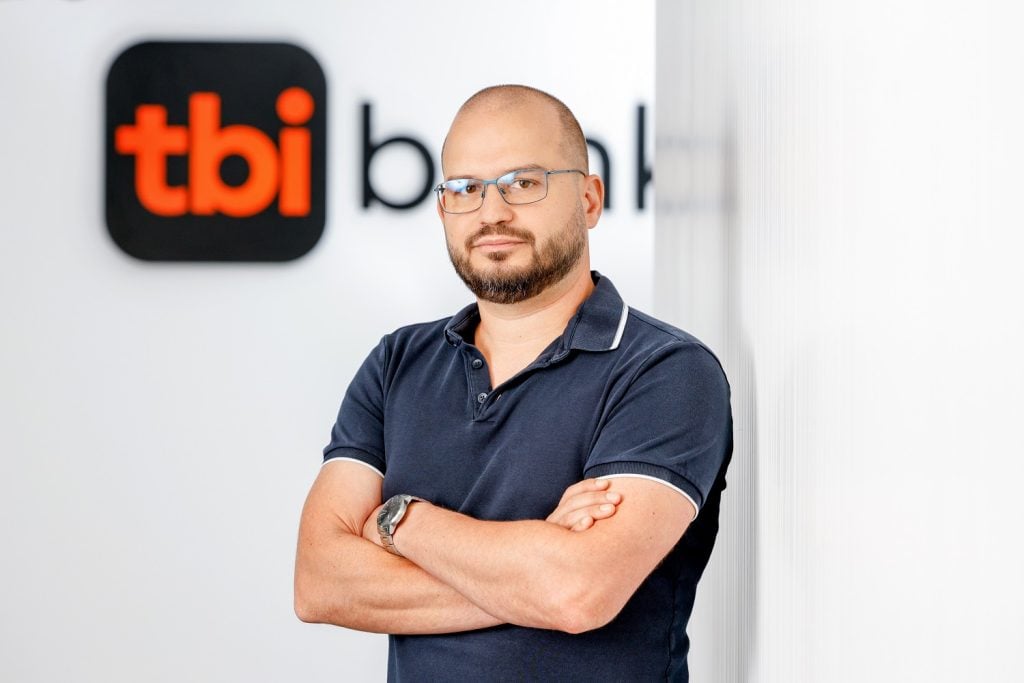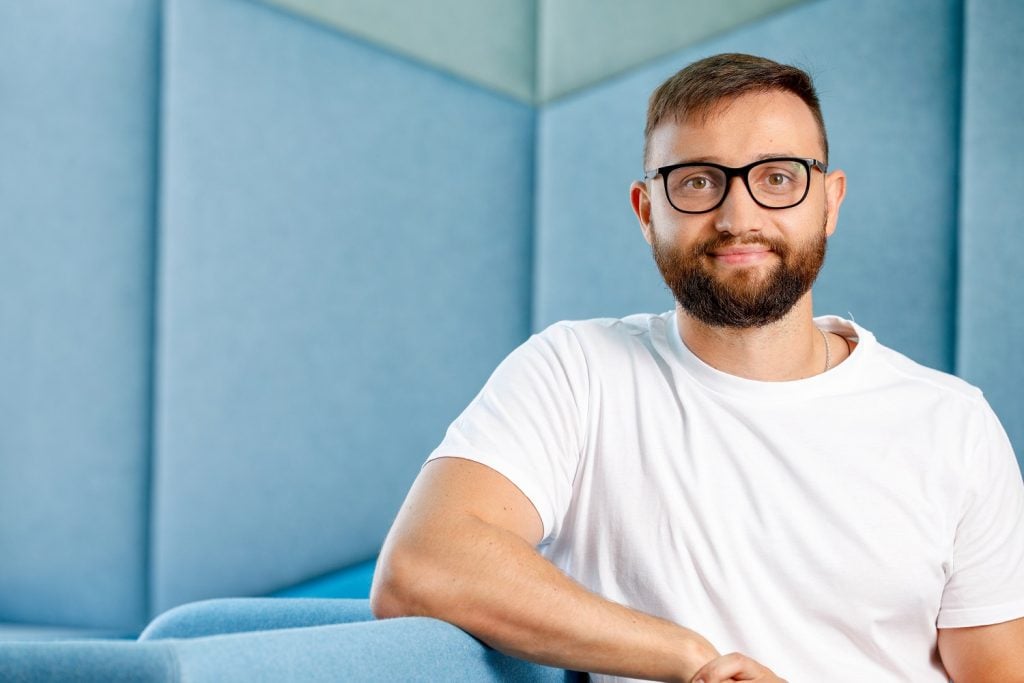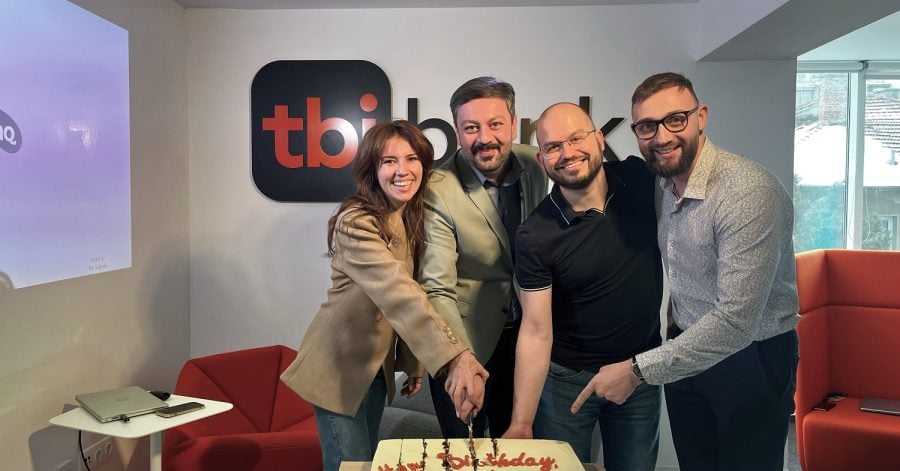Creating a user-friendly banking product that stands out requires a deep understanding of customer needs, a well-coordinated development process, and effective market communication. At tbi bank, this challenging task is undertaken among others by Elena Kaneva, Vladimir Tsanev, and Oleksandr Kyslashko. Together, they have navigated the complexities of introducing the neon card, which, in conjunction with tbi’s mobile app, aims to deliver a truly customer-centric banking solution.
In just its first year on the market, the neon card facilitated over 1 million transactions, illustrating its significant impact and potential. So, we decided to have а conversation with part of the multicultural neon team and provide a behind-the-scenes look at what it takes to develop a successful banking product in today’s dynamic market environment.
Who is who on tbi’s product team
Elena Kaneva: Bridging Product and Marketing
As the Head of Product Marketing, Elena Kaneva ensures that both the market and the bank’s internal teams can clearly understand the bank’s products. Her duties include managing communications within the tbi mobile app, spearheading marketing campaigns, and leading the customer service team’s training programs.
“Our main struggle is the educational part as this is a totally new product for the market, and it takes time for customers to get familiar with the nature of what we’re offering,” Elena elaborates. The team employs creative strategies to facilitate this educational process, gradually increasing customer familiarity and acceptance.
Vladimir Tsanev: The Communicative Problem Solver
Vladimir Tsanev serves as the neon lead—or head of product—where his main responsibility is to align the product’s features with customer expectations. Drawing insights from customer feedback and leveraging his understanding of the bank’s internal systems, Vladimir ensures the product meets practical needs effectively. He also addresses any operational queries, becoming a central figure in problem-solving: “If someone has questions about how something works, I am the person. If someone has questions about why something is not working – I am the person again.”
Oleksandr Kyslashko: Advancing Technological Excellence
Oleksandr Kyslashko, as the CIO of Banking App Technology, spearheads the technical development of the neon card’s mobile application. He ensures that the app’s technology not only meets but exceeds industry standards, drawing on best practices used by top European banks and prominent neobanks. “Our tech is really good, close to the best neobanks in the world. We always follow the best practices and vendors,” Oleksandr asserts, highlighting the technical prowess his team brings to the table.
How is the product development process structured in tbi?
Vladimir outlines the initial stages of development: “It all starts with the creative part and deciding what to build. Of course, we’re still a bank so even the greatest ideas need to go through the approval process.” Once an idea is approved, the team uses tools like Jira for task management and project execution. The communication systems at tbi are notably open, allowing for straightforward, hierarchical-free discussions. “We have different systems for communication but overall we can write to everyone – I can write to our CEO Petr Baron and he will answer me. We don’t have strict rules that everyone should follow,” Vladimir explains, highlighting the flexibility and openness within the bank.
Elena emphasizes the customer-focused approach of the team: “The customer is at the center of everything we do and when we receive important feedback—we’re doing lots of analytics based on the customer service chats, so we can understand when there is a need we haven’t satisfied.” This feedback directly informs the adjustments and enhancements Vladi and his team make to the product. “Internally, we sometimes have different ideas but when we have to make the decision it’s always about making the customer happy,” she says. The team’s agility and openness to continuous learning and improvement are crucial to their process.
Oleksandr focuses on employing various customer development methodologies, including deep customer interviews, prototyping, and A/B testing, to refine the product. “As part of this, we aim to understand what the problematic steps of the process are and what needs to be improved.” he describes. His goal is to simplify the banking process, eliminating unnecessary steps and enhancing user interface simplicity and clarity. “We translate this simplicity in our interfaces, tone of voice—we try to make it as easy as possible for the customer,” Sasha adds.

Prioritization of ideas and customer feedback
At tbi bank, prioritizing feedback and ideas is crucial to refining the neon card, ensuring that the product continually evolves to meet customer needs and regulatory requirements.
Oleksandr discusses the importance of aligning prioritization with the bank’s product strategy and long-term goals. “Prioritization for us is very important. So, we look at our product strategy and how the product should look like in the future and what’s our end goal,” he explains. Regulatory compliance also plays a significant role, with 20-30% of changes dedicated to compliance and Anti-Money Laundering (AML) requirements. However, the majority of their efforts are customer-centric. “When a decision needs to be made, we always look at how many customers a given change would impact, how much time we will save for them,” Sasha adds..
Vladimir shares an example of how external user research plays a role in gathering unbiased feedback. “Once we hired a user research agency, which recruited some potential customers and tested with them different functionalities we shared as white label—nobody knew who the bank was so the people could openly say, we like this, we hate this.” The insights gained from these sessions are invaluable, revealing diverse customer preferences and behaviors, such as the importance of free ATM withdrawals or the option to split payments into installments.
Elena emphasizes the critical role of communication in introducing new products. By engaging directly with customers, Elena can assess which messages resonate best and adjust the bank’s communication strategies accordingly. “And I tried testing different messages, seeing which ones are working, which ones are not working at all,” she adds. Understanding customer concerns and addressing them effectively is vital. “When you talk to the customer, you can really understand what their worries are and what problems of theirs you can solve with the product.”
She also highlights the importance of simplicity in communication: “For a banking product in general, it’s very important to describe it in simple and easy-to-understand words. Otherwise, customers won’t understand the benefits.”

What banking customers in Bulgaria really want in 2024?
The development team at tbi bank has been keenly aware of the evolving customer expectations in the banking sector, especially regarding cost and convenience, and has tailored their strategies to address these effectively.
Vladimir started with one of the fundamental customer demands: the expectation of free services. “First of all, they want everything for free. So, we addressed that by providing the first card product with no fees for the card nor the account, nor the app.” However, this generous offering initially met with skepticism. “When we started customers couldn’t believe these can actually be free and this is something we’re still fighting when it comes to communications – people think that if you give everything for free, you’re trying to trick them,” Vladimir explains. This ongoing challenge has necessitated persistent and clear communication to assure customers of the bank’s transparency and integrity.
At the same time, Elena highlights the bank’s commitment to making the banking experience as accessible and simple as possible. “When we started the project, we went the extra mile to make everything so easy that even my grandmother (83 years old) can use the application,” she says. This focus on usability underscores tbi’s goal for customers to manage their banking needs completely remotely, enhancing convenience and eliminating the need to visit a branch.
Oleksandr emphasizes the importance of efficiency and human interaction in banking. “Customers are always appreciative if you save them time. In today’s world, you have no way to explain why they have to wait – no matter whether it is for onboarding, opening an account,” he notes. Despite the push towards digital solutions, tbi bank maintains a strong human element in customer service. “And we still provide 24/7 customer support by humans in the app, which is equally important – if you have a problem, to be able to reach out to someone to help you solve it. You can reach a manager in one click,” Sasha adds. This approach ensures that customers feel supported by real people who can empathize and assist, rather than relying solely on automated tools.

Partnerships with external tech vendors vs. in-house development
At tbi bank, the approach to product development and enhancement involves a mix of in-house expertise and strategic partnerships with external vendors. This strategy allows the bank to leverage external innovations while focusing on their core competencies.
Elena explains the rationale behind seeking external partnerships: “Obviously, you cannot be the best in everything. We want to be the best in our own domain but when it comes to services where we’re not the best – it’s better to look for a partner.” This perspective guides tbi bank’s decision to collaborate with specialists in certain areas, ensuring that they provide top-notch services across all aspects of their banking experience. “For example, in the beginning, we tried doing stories in the app ourselves, but the results were not good enough for our standards, so we found Storyly and now our engagement rates and Monthly Active Users (MAUs) are better than ever,” she adds.
Oleksandr emphasizes the necessity of maintaining high standards by selecting the best service providers in the market. “We need to be best-in-class. In order to be best-in-class, you need the best providers,” he states. Comparing banking technology to building with “big Lego blocks,” he argues that the quality of these blocks determines the quality of service provided to customers. tbi bank continually evaluates its technology partners to ensure they are using the most advanced and effective solutions available. “Even though we’re already using the best, we always research the latest best options. We want providers to be constantly growing, investing, and improving as well,” Sasha mentions, underscoring the ongoing pursuit of excellence and adaptation in their tech stack.
What the Team Loves Most About Working on tbi bank’s neon card
Each member of the tbi bank team cherishes unique aspects of their work, contributing to a vibrant and dynamic work environment that fosters innovation and growth. Their passion drives the development of the neon card.
Elena appreciates the lighter, more personal aspects of working at tbi bank, along with the open, constructive communication culture. “She values the openness to critical feedback, which facilitates productive discussions and continuous improvement. “Not always do we get things right from the first time, but we’re listening, we’re improving, and we’re trying to be better,” she explains.
Vladimir thrives on the brisk pace at which the team operates, especially when rolling out new features and updates: “The speed of doing things and new releases is also great,” he adds.
Oleksandr finds great satisfaction in seeing the tangible outcomes of the team’s efforts. “For me, it’s about seeing our solutions being used by customers in real-time and seeing the impact and result of your work,” he says.
Making banking fun again
tbi bank is breaking the mold of traditional banking by injecting fun and personality into its services, transforming how customers interact with their financial institution. This approach is deeply ingrained in their philosophy and reflected in their innovative practices.
The ethos of making banking enjoyable is embodied by Tibi, tbi bank’s virtual unicorn assistant. Tibi is designed to be not just helpful but also engaging and humorous. ” Tibi, our unicorn, was built to be very straightforward and very sassy at times. But most of all, he is trying to be funny,” Elena explains. This virtual assistant simplifies banking jargon for customers, using simple words and a touch of humor to make financial management more accessible and less intimidating.
Injecting humor into banking goes beyond just character design. It extends into the very way tbi bank communicates daily with its customers, whether through error messages or push notifications. The challenge, however, is to strike the right balance. ” We’re still a bank but you don’t have to be that official,” Elena continues. The evolving customer base, particularly younger generations, appreciates this less formal approach, which resonates well with their expectations.
This strategy is particularly effective in building a positive relationship with customers, making them more likely to engage with the bank regularly.
Personal goals for 2024
Elena is focused on increasing awareness and understanding of the neon card’s unique features among users. “I want as many Bulgarians as possible to understand the shopping limits of the neon card, which allows them to buy the things they desire, using our funds and split the payment over 3 months (for free), or 6 and 12 months (with a small fee),” she explains.
Vladimir’s goal for the new year is focused on the technical and operational excellence of the neon card. He aims to ensure that each new feature not only meets but exceeds customer expectations, thereby maintaining a high level of user satisfaction and minimizing any operational issues.
Oleksandr sets a challenging goal of delivering high-quality, comprehensible banking solutions that are both innovative and user-friendly. “I just want to deliver –a quick app covering all customer shopping needs that will work properly 24/7,” Sasha outlines.








